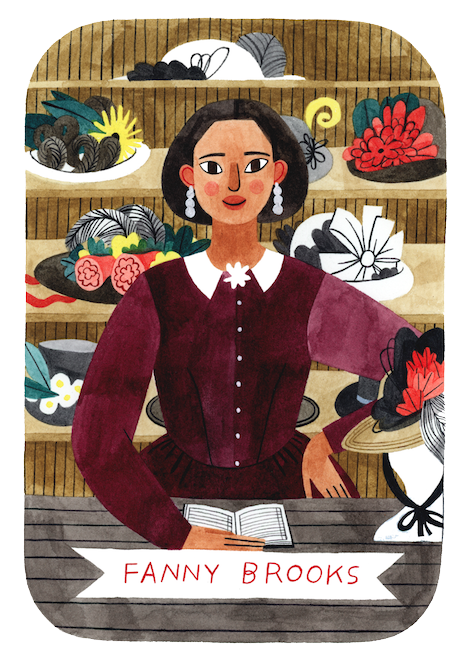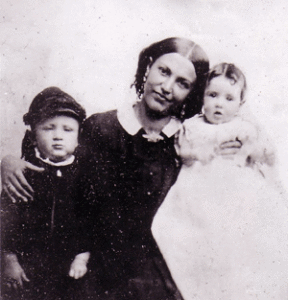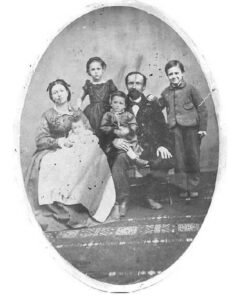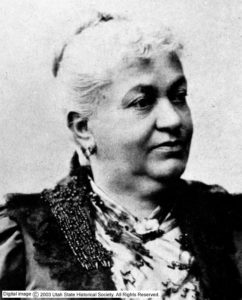
Additional Resources
Fanny Brooks,
Always the Business Woman
1836-1901
“Always the business woman”
by Rebekah Clark
Historical Director, Better Days
Fanny Brooks, the first Jewish woman to settle in Utah, gained prominence as a successful businesswoman in the new territory. Energetic, diplomatic, and resilient, Fanny became an influential member of Salt Lake City’s economic, religious, and social community.
Isabella Bruck was born to Joseph and Johannah Bruck in Schweidnitz, Germany in 1836. She was known by the nickname “Fanny” throughout her life and anglicized her last name to Brooks after her marriage. Fanny received a good education and completed school with high honors, spoke German and French as well as some English, and played guitar and piano. In 1853, her uncle Julius Gerson Brooks returned to Germany with tales of the riches and beauty of America. His adventures captivated young Fanny. After she begged him to take her to America, they were married and set sail at once from Hamburg to New York City. Fanny enjoyed the voyage and entertained the other passengers each night with folk songs and jokes. From New York, they travelled by boat to Illinois and Nebraska then joined a wagon train heading west to California. Tragically, Fanny’s first baby died along the plains.

Bancroft Library, University of California Berkeley
Upon entering Salt Lake City, the couple decided to settle briefly in Utah.[1] Fanny started a business selling women’s hats, and city tax records indicate that “Isabell Brooks” owned a profitable millinery shop and paid her taxes in full.[2] “Mrs. Brooks’ Millinery Store and Bakery” was listed among the twenty-two businesses classified as doing “good cash business” in Salt Lake City in 1854.[3] As tensions escalated between Mormons and non-Mormons, Fanny and Julius left Utah and tried several business ventures in California, Oregon, and Idaho before permanently settling back in Salt Lake City in 1864 with their growing family. Julius invested in real estate and Fanny managed their businesses, first by running a busy boarding house and later by once again opening a successful millinery store in 1877.
Her daughter later recalled: “Mother was always the business woman, while Father attended to the buying….They had beautiful goods, and Mother arranged them so nicely that they soon had the trade of the town.”[4] Fanny became known for her personal attention to customers and her good business sense, realizing that “if a customer was pleased she would always come back.” Fanny acknowledged that Julius would be lost at the store without her. He once told a frustrated customer, “My dear lady, if I had hats to make ugly ladies look pretty, I would be a millionaire.” Upon seeing the insulted woman storm out of the store, Fanny deftly pacified the customer and even managed to sell her three new hats.

Bancroft Library, University of California, Berkeley.
As one of only a few Jewish families in Salt Lake City, the Brooks helped establish the Jewish community in Utah while developing positive relationships with the Mormon population. Life in the new territory was not easy, and they experienced hardships, uncertainty, and even tragedy—of their six children, only one survived past early adulthood—but Fanny and Julius were determined to make a good life for their family. The Brooks children attended an LDS Sunday School for years, and their daughter remembered playing with Brigham Young’s children.
In 1868, after Brigham Young issued an edict forbidding Mormons to do business with non-Mormons, Fanny’s tenants began moving out of her boarding house and other non-Mormon merchants began leaving town. Not willing to give up their home so easily, Fanny demanded a personal meeting with Brigham Young in which she respectfully explained, “all our money is tied up in real estate, and if we can’t rent them we will starve.”[5] Young assured “Sister Brooks” that he would hate to have her family leave because she had always paid “tithing” and never hurt the Mormons. He agreed to allow his followers to continue doing business at her boarding house and even donated the land for a Jewish cemetery in Salt Lake City the next year.

Courtesy of the Utah State Historical Society.
Fanny Brooks left her mark on Utah. When a Jewish temple was constructed in Salt Lake City in 1890, Fanny’s photograph was included in the cornerstone in honor of her being the first Jewish woman to settle in Utah Territory.[6] She died in Germany on August 21, 1901, while visiting her homeland. She is buried next to her husband in the B’nai Israel Cemetery, the Jewish section of the Salt Lake City cemetery. As her obituary states, she was not only a “prominent” and “charming woman with many lovable traits, and [a] wide circle of friends,” she was also the owner of several valuable pieces of real estate property.[7] She left behind a legacy of economic skill, professional courtesy, and social and religious cooperation.
Rebekah Clark holds a law degree from J. Reuben Clark Law School and a bachelor’s degree in American History and Literature from Harvard University, where she wrote her honors thesis on Utah’s participation in the national women’s suffrage movement. She is a member of the Mormon Women’s History Initiative Team and the Historical Director for Better Days.
Footnotes
[1] There are discrepancies among the records regarding the Brooks’s arrival date and how long they stayed in Utah in the 1850’s, but the available sources all agree that they were the first Jewish couple to settle in Utah.
[2] See Juanita Brooks, The History of Jews in Utah and Idaho (Western Epics, 1973) 16.
[3] Reprinted letter from the Salt Lake City LDS Historian’s Office to Franklin D. Richards, August 29, 1854, Millennial Star, (November 18, 1854) 733.
[4] Frontier Reminiscences of Eveline Brooks Auerbach, Annegret S. Ogden, ed. (Berkeley: Friends of Bancroft Library, University of California, 1994) 85.
[5] Frontier Reminiscences, 53.
[6] “The Cornerstone of the Jewish Temple Laid,” Salt Lake Herald, September 27, 1890.
[7] “She Passed Away in Germany,” Salt Lake Tribune, August 23, 1901.

